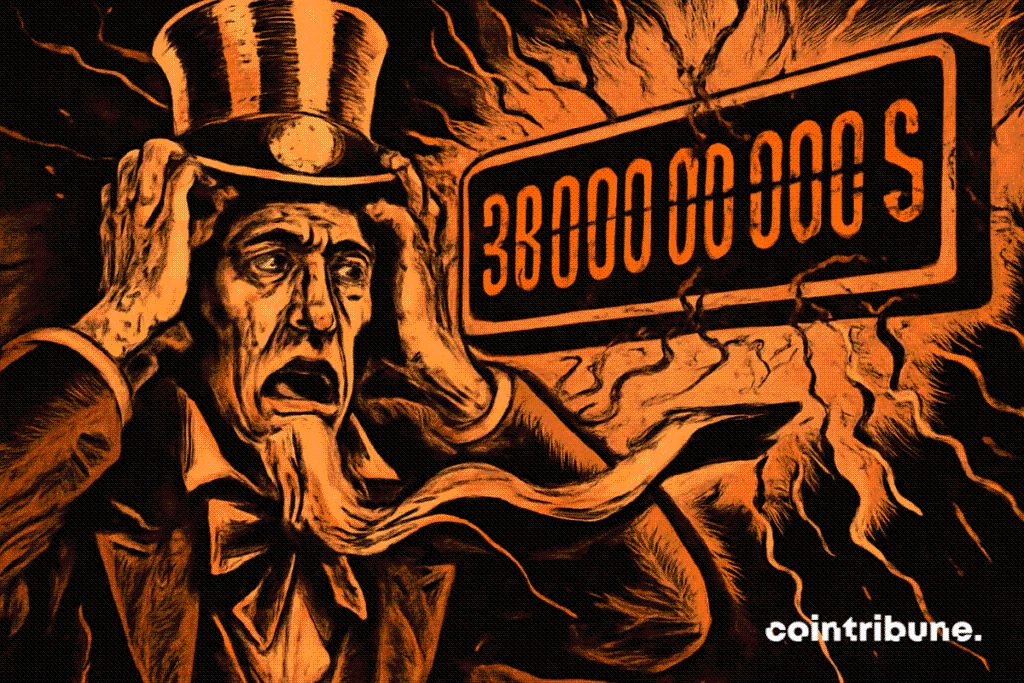$69,713 Per Second : How Fast U.S. Debt Is Growing ?
In the midst of budget paralysis, the US public debt reaches 38 trillion dollars, a historic record. This threshold, revealed by the Treasury, raises questions about the budget trajectory of the United States, as monetary policy remains under pressure and crypto regulation remains unclear.

In Brief
- The United States crosses a historic record with 38 trillion dollars of public debt, amid a partial government shutdown.
- The debt has increased by 1 trillion dollars in less than two months, an unprecedented acceleration outside of the pandemic period.
- Experts warn of the consequences: increased inflation, higher borrowing costs, and an explosion of interest charges to come.
- The administration claims to have reduced the deficit to 468 billion dollars, thanks to a policy of budgetary austerity.
The US Debt Crosses a Historic Threshold
The gross US debt surpassed this week the threshold of 38 trillion dollars, a rapid increase marking “the fastest accumulation of a trillion dollars outside the pandemic”, according to the Treasury report .
The country reached 37 trillion last August, meaning that an additional trillion was added in less than two months. This steep rise occurs even as the federal administration undergoes a shutdown due to a political deadlock over the budget. The Congressional Joint Economic Committee calculated that the debt is currently increasing at the rate of $69,713.82 per second.
The economic consequences of this dynamic are widely documented by experts :
- Increased inflation and reduced purchasing power : “this additional inflation accumulates and erodes consumers’ purchasing power”, explains Kent Smetters from the University of Pennsylvania, discussing the impact on younger generations’ ability to own homes ;
- Rising borrowing costs for households : the Government Accountability Office warns about the mechanical effect of high debt on mortgage and auto loan interest rates ;
- Reduced private and public investments : a growing share of available resources is absorbed by debt, to the detriment of the real economy ;
- An explosion of interest charges to come : “we spent 4 trillion dollars on interest over the last decade, but will spend 14 trillion in the next ten years”, says Michael Peterson of the Peterson Foundation.
Trump, Bessent and the Promise of a Shift to the Right in Fiscal Policy
In this highly volatile budget context, Scott Bessent, Treasury Secretary and former hedge fund manager, stated Wednesday that the US deficit was brought down to 468 billion dollars between April and September 2025, “the lowest level since 2019”.
The White House, through spokesperson Kush Desai, claims that this improvement is the result of a policy combining “spending cuts and revenue increases”, and promises to continue this strategy with “robust economic growth, lower inflation, increased customs revenues, reduced borrowing costs, and a fight against waste and fraud”.
Contrary to warnings by several economists, the Trump administration presents these results as signs of prudent management. However, this interpretation questions the real sustainability of the long-term budget strategy, especially if interest rates remain high.
The choice of Scott Bessent, a figure from speculative finance, may also indicate an intention to strengthen deregulation, which could influence financial regulation and thus the crypto environment. Even though no direct statements about cryptos, particularly bitcoin, have been made at this stage, this more liberal economic direction could affect risk perception by investors and the dollar’s role as the world reserve currency.
In the medium term, this fiscal positioning could cause tensions with the Federal Reserve or reignite a showdown over the debt ceiling, with systemic consequences on global markets. In this uncertain context, some sector players already see bitcoin or other assets as safe havens in case of a shock to US sovereign debt.
Disclaimer: The content of this article solely reflects the author's opinion and does not represent the platform in any capacity. This article is not intended to serve as a reference for making investment decisions.
You may also like
Shiba Inu’s Focus on Privacy Aims to Draw DeFi Interest Amid Price Challenges
- Shiba Inu (SHIB) stabilizes near $0.00000851, with traders monitoring $0.000008390 support and $0.000008840 resistance amid a descending channel pattern since early 2025. - A 1.7% weekly gain contrasts with a 17.4% drop from its 14-day high, while $132.8M trading volume highlights uncertainty despite a privacy-focused Shibarium upgrade integrating Zama's FHE technology. - Technical indicators show fragile equilibrium, with bearish EMAs and $380K net outflows reinforcing distribution trends, though analys

Bitcoin News Update: Greenidge Transitions to AI as Bitcoin Mining Faces Rising Expenses and Regulatory Challenges
- Greenidge Generation , a Bitcoin miner, shifts to AI/HPC amid industry cost and regulatory pressures. - Bitcoin mining profitability declines as hashrate hits 1.16 ZH/s and hash prices fall below $35. - Companies like Bitfarms abandon Bitcoin for AI/HPC, while CleanSpark reports $766M mining revenue surge. - Regulatory scrutiny intensifies over foreign mining hardware, with BlockQuarry promoting domestic alternatives. - Energy costs and debt disputes force Tether to halt Uruguayan mining, highlighting se

Bitcoin News Update: Institutions Favor Bitcoin's Reliability as Altcoin Growth Slows
- Bitcoin's market dominance exceeds 54%, driven by waning altcoin momentum and institutional preference for stability. - Altcoin Season Index at 23 signals Bitcoin-centric trends as macroeconomic pressures and regulatory uncertainty weaken alternative cryptocurrencies. - Institutional investors prioritize Bitcoin's scalability and infrastructure, exemplified by Bhutan's Ethereum integration and Bitcoin Munari's fixed-supply presale model. - Analysts highlight Bitcoin's role as a macroeconomic barometer, w
MMT Token TGE: Is This the Dawn of a New Era for Digital Asset Foundations?
- MMT Token's 2025 TGE secured $100M valuation from Coinbase Ventures, OKX, and Jump Crypto, with 1330% price surge post-launch. - Momentum DEX on Sui reported $13B trading volume and $320M TVL, leveraging CLMM architecture and cross-chain RWAs for institutional appeal. - 55% of hedge funds now hold digital assets, driven by U.S. CLARITY Act and EU MiCA 2.0, as MMT's RWA focus bridges traditional and blockchain finance. - Despite macroeconomic risks like 34.6% post-TGE volatility, MMT's governance model an

